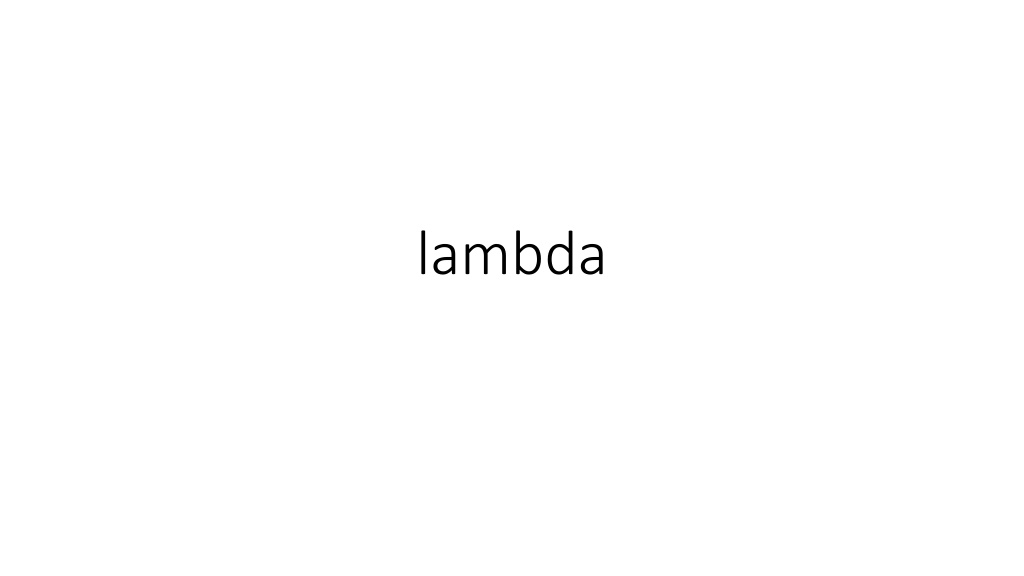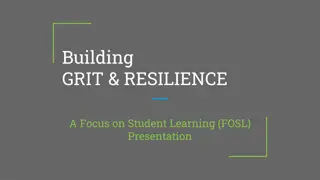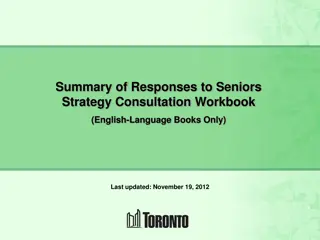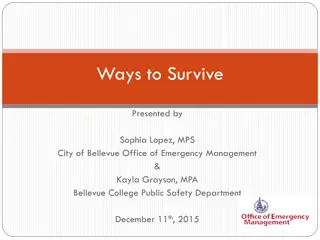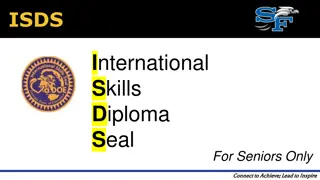Preparing for Tomorrow: Seniors' Guide to Academic Success
In preparation for the future, seniors can take proactive steps today such as knowing their school counselors, creating a college checklist, and checking their high school grades and courses. It's essential to stay organized, register for standardized tests, and begin filling out college applications. By following these steps, seniors can set themselves up for a successful transition to higher education and beyond.
Download Presentation

Please find below an Image/Link to download the presentation.
The content on the website is provided AS IS for your information and personal use only. It may not be sold, licensed, or shared on other websites without obtaining consent from the author.If you encounter any issues during the download, it is possible that the publisher has removed the file from their server.
You are allowed to download the files provided on this website for personal or commercial use, subject to the condition that they are used lawfully. All files are the property of their respective owners.
The content on the website is provided AS IS for your information and personal use only. It may not be sold, licensed, or shared on other websites without obtaining consent from the author.
E N D
Presentation Transcript
A lambda expression is composed of three parts. Argument List Arrow Token Body (int x, int y) -> x + y
Lambda functions canvas.setOnMouseEntered((a) -> System.out.println("hi")); canvas.setOnMousePressed((a) -> System.out.println("focus")); canvas.setOnKeyReleased(new EventHandler<KeyEvent>() { @Override public void handle(KeyEvent event) { System.out.println("Handled"); } });
// with no parameter () -> System.out.println("Hello, world.") // with one parameter (this example is an identity function). a -> a // with one expression (a, b) -> a + b // with explicit type information (long id, String name) -> "id: " + id + ", name:" + name // with a code block (a, b) -> { return a + b; }
// with multiple statements in the lambda body. It needs a code block. // This example also includes two nested lambda expressions (the first one is also a closure). (id, defaultPrice) -> { Optional<Product> product = productList.stream().filter(p -> p.getId() == id).findFirst(); return product.map(p -> p.getPrice()).orElse(defaultPrice); }
Alus: lambda-arvutus Lambda-arvutuse keel on Alonzo Churchi poolt 1930. aastatel leiutatud lihtne ja universaalne meetod funktsioonide kirjapanekuks. Lambda-arvutuse teooria tegeleb arvutatavuse ja arvutatavate funktsioonide uurimisega, kasutades selleks lambda-arvutuse keelt kui universaalset programmeerimiskeelt. Churchi tees v idab, et iga algoritmi saab lambda-arvutuse keeles kirja panna. On v imalik n idata, et lambda-arvutus, nagu ka Prolog, C ja Basic on ks paljudest universaalsetest programmeerimiskeeltest. Konkreetselt on lambda-arvutuse keel ja teooria funktsionaalsete programmeerimiskeelte aluseks.
Example 1: Example 1: Print a list of integers with a lambda Print a list of integers with a lambda List<Integer> intSeq = Arrays.asList(1,2,3); intSeq.forEach(x -> System.out.println(x)); x -> System.out.println(x) is a lambda expression that defines an anonymous function with one parameter named x of type Integer
Example 2: Example 2: A multiline lambda A multiline lambda List<Integer> intSeq = Arrays.asList(1,2,3); intSeq.forEach(x -> { x += 2; System.out.println(x); }); Braces are needed to enclose a multiline body in a lambda expression.
Example 3: Example 3: A lambda with a defined local variable A lambda with a defined local variable List<Integer> intSeq = Arrays.asList(1,2,3); intSeq.forEach(x -> { int y = x * 2; System.out.println(y); }); Just as with ordinary functions, you can define local variables inside the body of a lambda expression
